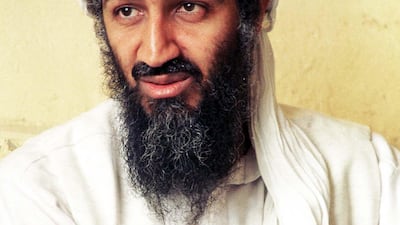On Wednesday, the Central Intelligence Agency released nearly half a million files recovered from the 2011 raid that led to the killing of Osama bin Laden in his compound in Abbottabad, Pakistan.
While researchers are still ploughing through the massive pile of data, some fascinating titbits have already surfaced about the life of bin Laden and the networks of the international organisation he had established. These revelations include new evidence confirming the global terror organisation maintained ties with the Iranian regime throughout the years.
In particular, details found in a handwritten journal he kept shed light on the ideological origins of the man who globalised Islamic jihadism in a way that nobody had before.
In the journal, bin Laden offers answers to a series of questions about the ideas and movements that influenced him. For example, he lists the Muslim Brotherhood as an organisation that shaped some of his thinking in the early days of his radicalisation. More astonishingly, he reveals an unexpected and hitherto unknown source of inspiration: Necmettin Erbakan, the former prime minister of Turkey who could be regarded as the father of modern Turkish Islamism.
Bin Laden's membership of the Muslim Brotherhood was first confirmed by the current leader of Al Qaeda, Ayman Al Zawahiri, in a video released in 2014. “Sheikh Osama bin Laden was part of the Muslim Brotherhood organisation in the Arabian Peninsula,” Zawahiri said in the video. “When the Russian invasion of Afghanistan happened, the sheikh travelled immediately to Pakistan, met the mujahideen and started helping them.”
In the released documents, bin Laden is asked to list his influences. His responses are short and concise.
“From a religious [or theological] aspect, I was committed within the Muslim Brotherhood. Their curriculum was limited. I read the Sira [Prophet Muhammad’s biography, a reference to old books relating the beginnings of Islam and the Prophet’s life with typical focus on wars]. Once a week, the meetings. The number of pages was limited. The extent of influence by them was not much from a religious aspect.”
He is next asked whether he was influenced by Abdul Majeed Al Zindani, a Yemeni cleric and a member of the Brotherhood’s Islah Party in Yemen, known for his work on “the scientific miracles” found in the Quran. “I was influenced by his specialisation, not in a teacher-student sense,” bin Laden says.
He then explains that he grew up in an ordinary family. He was a practising Muslim. On factors that led him to jihad, he says: “It wasn’t one thing. I was looked after [in terms of religious commitment] by family, but no side was guiding me in the way the Brotherhood do. I was normal.”
He also mentions that the first time he travelled to engage in jihad was to Turkey in 1976, and suggests the trip was paid for by the Brotherhood. He then cites Erbakan as the reason for his trip but it is unclear what the link was between Erbakan and the idea of jihad.
“It was the first time I travelled to a country where I did not know the language,” he writes. “I carried a pistol and went. The Brotherhood, they had poor knowledge about things. If they knew, I would not have had to travel through Syria to Antakya 12 hours by bus to reach Istanbul. It was easier from Jeddah to Istanbul by plane. Three hours by plane.”
Bin Laden revealed that his gravitation towards jihad began during his time in high school. During those years he travelled to the West and even visited the birthplace of Shakespeare in Stratford-upon-Avon, in Britain. He stopped travelling, according to the journal, when he became “aware” that Muslims should not travel to the West, apparently while he was still a practising member of the Muslim Brotherhood.
In other pages, bin Laden comments on the Arab uprisings in 2011. In one instance, he pins hopes on Yusuf Al Qaradawi, the prominent Islamist cleric based in Doha. The cleric is known for his generally moderate fatwas regarding Muslim lifestyle, but also for issuing fatwas that have sanctioned suicide bombing and jihad over the past two decades.
“Qaradawi, if he talks, that will help and boost popular confidence that the (Libyan) rebels are right,” he writes. “Qaradawi’s shift [means that] Qaddafi is over.”
He also commends Al Jazeera's Arabic channel for its role during the uprisings: “Al Jazeera, thank God, carries the banner of revolutions.”
__________________________
Read more:
Al Qaeda's love affair with the ayatollahs of Iran: my enemy's enemy is my friend
The bin Laden files: Influenced by Muslim Brotherhood, offers details on Al Qaeda relation with Iran
Jabhat Al Nusra and Al Qaeda: the riddle, the ruse and the reality
_________________________

